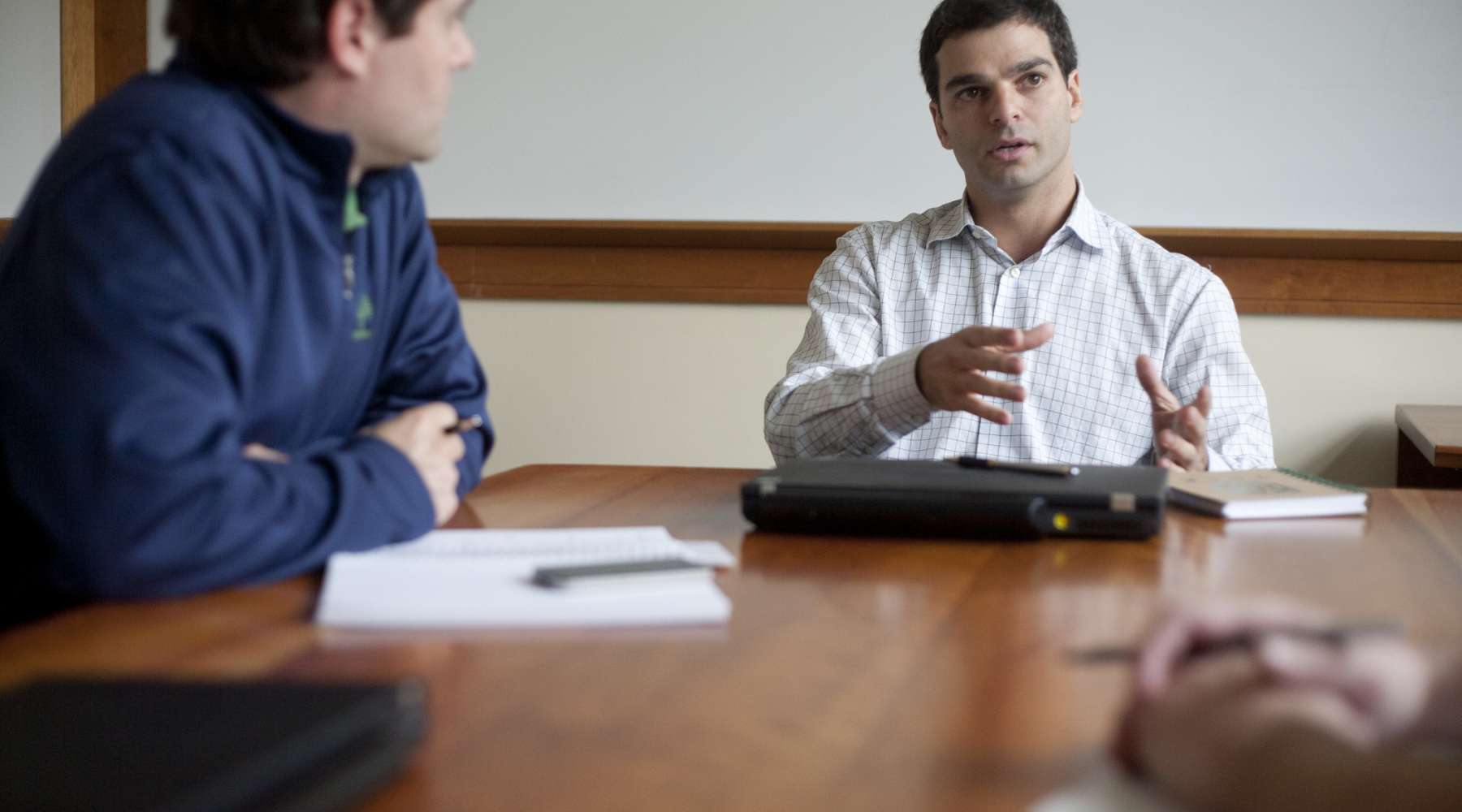

 Joaquin Villarreal T’08 (left) is manager of the Entrepreneurship Initiative at Tuck.
Joaquin Villarreal T’08 (left) is manager of the Entrepreneurship Initiative at Tuck.
Mathias Machado T’09 is an associate director of the Career Development Office (CDO).
Q: How can I become a great entrepreneur?
Mathias Machado: Entrepreneurs need grit because they are inevitably going to face disappointment and discouragement. What do you say to someone who’s hit a roadblock?
Joaquin Villarreal: Welcome to the club! That’s what entrepreneurship is: hard work, obstacles, and more hard work. Unless you happen to be the movie version of Mark Zuckerberg, it’s not going to be easy. I want to stress that point: the classic movie success story—a guy in a dorm room one second, a trillionaire the next second—that’s 0.1% of the entrepreneurial experience at most.
MM: Like we also discussed earlier, there’s a lot of changing your idea along the way, too. Even with Facebook, what it became was not the original idea.
JV: Exactly. Entrepreneurship involves a lot of banging your head against walls.
MM: So what advice do you have for someone to sharpen their entrepreneurial skills to—let’s hope—make their journey a little more successful?
JV: Train yourself to execute. You want to be in the mindset of getting things done, not just planning to do things and thinking, because you’ve planned them on paper, that they’re done.
MM: How do you draw the line between action and planning?
JV: You should plan before you do anything. Think of it this way: if you take a bus, you’ve got to plan which bus you’re going to take, but you’re not actually taking the bus until you’re physically on it. It’s the same concept. You’ve got to plan before you execute, but until you execute, then you’re not an entrepreneur yet.
MM: Taking action and responsibility go hand-in-hand.
JV: Exactly. There are no excuses when you’re an entrepreneur: you can delegate tasks but not responsibility. Even if someone else dropped the ball or didn’t show up, when you own your own business, it’s your responsibility regardless. The sooner you adopt that mindset, the better off you’ll be.
Q: What Makes a Successful Entrepreneur?
MM: Entrepreneurship can seem like a mystery to a lot of people. Are there any qualities that give an aspiring entrepreneur an advantage?
JV: Too often, I think the answers to that question are clichéd and unhelpful. If I had to name one quality, I think back to a talk given by Brent Dance T’13, who works at Google. He is also an entrepreneur who started a couple of companies, including a nonprofit aimed at aiding and educating Russian orphans. I invited him for our speaker series and one of the things he said that stood out most was that an entrepreneur has to have grit. If you don’t have it, you’ll need it.
MM: Very true. After all, no entrepreneurial journey will be uneventful.
JV: If you get discouraged too easily, you’ll never make it. Like I said, I think people spend too much time discussing the qualities entrepreneurs need, but there’s no questioning the need for grit.
MM: What do you think is one of the most common pitfalls aspiring entrepreneurs should avoid?
JV: Focusing too much on the importance of the actual idea. The main question students ask our Entrepreneurs-in-Residence is, “How do I know if my idea is good enough to devote my life to it?” The answer is that there’s never an idea that’s “good enough”—you have to make the call yourself.
MM: That must come as a surprise.
JV: What I mean is that the idea is not the most important thing—there are so many paths to take and the idea changes so much that it makes more sense to focus more on what you are passionate about and what drives you. While you’re at Tuck, I would recommend you focus less on the idea and instead focus on learning and executing. That will help you the most, regardless of whatever the idea you end up settling on.
(Photo above by Laura DeCapua)